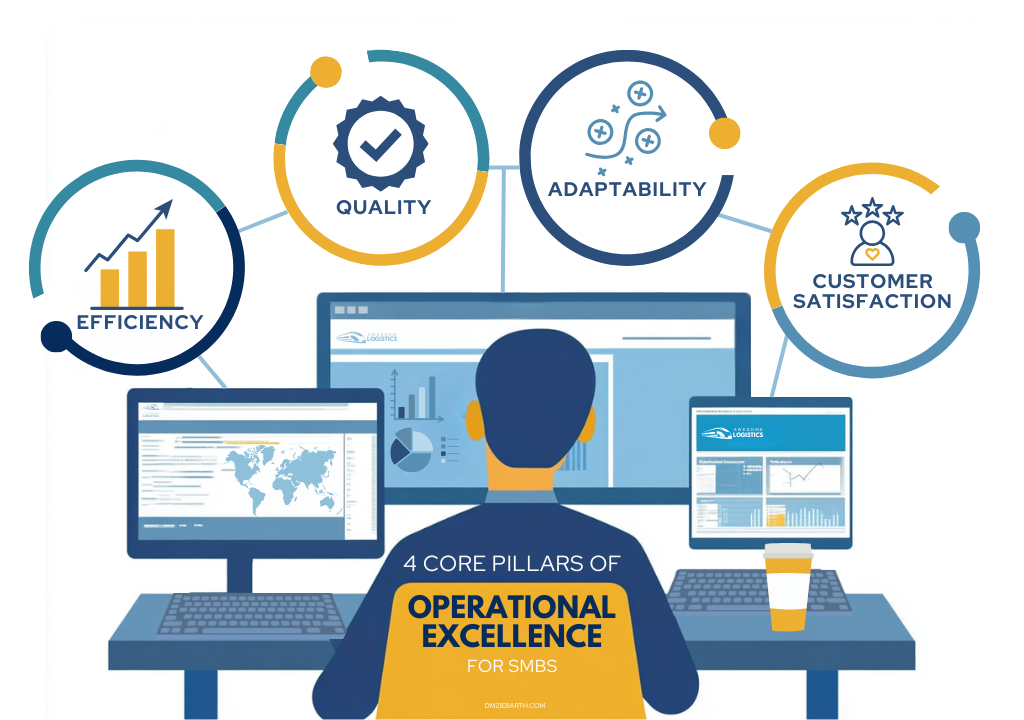Operational Excellence for SMBs: Core Principles

Imagine a small business owner, Maya, who manages a lean team of ten in her specialty coffee roasting company, Perk & Grind Roastery. Every day, she juggles multiple roles: overseeing production, talking to customers, managing orders, and tackling countless other administrative tasks (hello, broken breakroom toilet.) She knows her team’s hard work fuels the business, but as her company grows, Maya’s feeling the pressure. How can she ensure her operations are as efficient and resilient as possible, and keep her customers happy and her team motivated at the same time?
For small and medium-sized businesses (SMBs) like Maya’s, operational excellence is the key to growth, adaptability, and sustainability. Unlike larger companies with expansive budgets and staff, SMBs must make the most of their limited resources. Achieving operational excellence for an SMB means creating efficient, adaptable processes that empower employees and consistently deliver value to their customers.
By understanding the core pillars of operational excellence, business owners like Maya can build a foundation that not only supports growth but also nurtures customer satisfaction and long-term resilience. Here, we’ll explore what operational excellence means for SMBs, why it’s essential, and the core pillars that make it achievable.
Defining Operational Excellence in SMB Terms
For SMBs, operational excellence doesn’t necessarily mean having elaborate structures or overly complex workflows. It means implementing smart, flexible processes that drive consistent performance and support growth with minimal waste. Operational excellence in this context requires focusing on the basics: effective use of resources, high-quality outputs, adaptability, and customer-centered practices.
Take Maya, for example. When she first started Perk & Grind, she could manage inventory by memory and handle customer orders personally. But as orders grew, she found herself constantly tracking down supplies and realizing last-minute that she’d run low on beans. By investing in an inventory management system, Maya was able to keep a closer eye on her stock levels, saving time and avoiding rush orders. It was a small change, but one that made a big difference in how her team operated day-to-day.
According to Bain & Company, operational excellence in smaller firms is achievable through “scalable processes and a company culture that values improvement.” Building a lean and resilient foundation, especially through early investments in streamlined processes, can significantly reduce costs and support growth Bain & Company.
Why Operational Excellence Matters for SMBs
1. Enhancing Efficiency with Limited Resources
In a smaller business environment, resources—be it manpower, time, or capital—are typically limited. Operational excellence aims to ensure that these resources are used as effectively as possible. Inefficiencies and waste directly impact an SMB’s bottom line and can drain its ability to compete with larger companies. By honing efficient practices, SMBs can do more with less, creating a leaner operational structure that helps drive profitability.
For example, Maya realized that if her team spent less time handling administrative tasks, they could focus more on what they do best: roasting and selling coffee. She introduced a few automation tools to handle routine tasks like payroll and shift scheduling, freeing up time for her and her team to connect with customers and focus on perfecting their craft.
2. Improving Customer Satisfaction
Customer loyalty and satisfaction are vital for SMBs, where every client relationship counts. Operational excellence directly impacts customer experience by ensuring consistency and reliability in product or service delivery. For example, streamlining the order-to-delivery process, minimizing errors, and maintaining open lines of communication all contribute to better customer relationships. A commitment to operational excellence also helps SMBs respond swiftly to customer feedback, creating a cycle of continuous improvement that strengthens loyalty and trust.
Maya recently faced a situation where a regular customer gave her feedback that their favorite blend had seemed different in flavor. Alarmed, she implemented a quality control process to ensure consistency in every roast. Now, her team does a quick quality check each morning, giving customers peace of mind and earning Maya’s business a reputation for reliability.
3. Building a Resilient Foundation for Growth
Operational excellence allows SMBs to prepare for scalability. Implementing efficient processes and focusing on quality creates a resilient framework that can withstand the pressures of growth. Many small businesses fail when they try to scale without adequate operational foundations, leading to breakdowns in quality, customer service, and employee productivity.
Research from McKinsey & Company suggests that companies focused on operational improvements see a boost in employee morale and customer satisfaction, which is key for businesses seeking sustainable growth McKinsey & Company.

Core Pillars of Operational Excellence for SMBs
1. Efficiency
Efficiency in operations is about maximizing outputs with minimal inputs, reducing waste, and ensuring that every resource is used wisely. Efficiency can be achieved by setting up standardized processes and continuously evaluating performance. Tools like time-tracking software, project management platforms, and inventory management systems can help SMBs monitor and optimize their processes.
2. Quality
Quality is essential to customer satisfaction and the reputation of a business. For SMBs, operational excellence includes building quality into every aspect of the business, from product design and manufacturing to customer service. Quality control processes, feedback loops, and consistent training for staff contribute to maintaining high standards.
3. Adaptability
For SMBs, adaptability is crucial in a constantly changing market landscape. Businesses that incorporate flexibility into their operations are better equipped to pivot when new challenges or opportunities arise. This means creating adaptable workflows and encouraging a culture of continuous improvement, where feedback and innovation are valued.
Harvard Business Review highlights the need for “agility” in small businesses, emphasizing that adaptable structures and a culture of innovation allow companies to respond to market demands without extensive lag Harvard Business Review.
4. Customer Satisfaction
Customer satisfaction is not only an outcome of operational excellence but also a driving force. When SMBs prioritize customer experience, they shape their operations around meeting and exceeding expectations. This approach requires creating reliable, easy-to-navigate processes that are visible to customers, whether through faster delivery times, responsive customer service, or product consistency.
Moving Forward
Operational excellence is not a one-time initiative but a continuous journey. For SMBs, it involves laying down a framework that allows for constant improvement, quick adaptation to market shifts, and steady growth without sacrificing quality or customer satisfaction. When executed well, operational excellence enables small and medium businesses to operate on par with larger competitors, ensuring sustainable success and resilience in a competitive environment.
As for Maya, thanks to a few key changes, she’s finally found the time to savor a fresh cup of her own coffee before diving into her day (and yes, the Tuesday toilet saga has been resolved—for now). Perk & Grind Roastery, like so many other small businesses around the world, may be small, but with a solid foundation in place, they’re prepared to thrive, no matter what each new day brings.
References
Bain & Company. “Building Efficient Organizations.” Bain & Company.
Bain & Company. “What 'good' looks like: Creating an operational excellence management system.” Bain & Company.
McKinsey & Company. “How Operational Excellence Drives Sustainable Growth.” McKinsey & Company.
Harvard Business Review. “The Importance of Agility in Small Businesses.” Harvard Business Review.




Comments ()